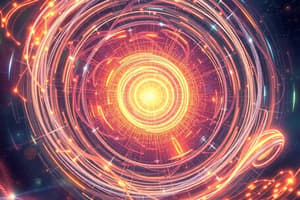Podcast
Questions and Answers
What does Sir Isaac Newton's laws of motion explain?
What does Sir Isaac Newton's laws of motion explain?
- The composition of celestial bodies
- The principles of quantum mechanics
- The behavior of objects at rest
- The relationship between mass, force, distance, and time (correct)
What does momentum represent in the context of forces?
What does momentum represent in the context of forces?
- A measure of an object's gravitational pull
- The resistance experienced by an object in motion
- The relationship between force and acceleration
- The product of an object's mass and velocity (correct)
In mechanics, what role does vector calculus play?
In mechanics, what role does vector calculus play?
- Helps in understanding the behavior of fluids
- Analyzes the behavior of light waves
- Calculates quantities related to displacement, velocity, and acceleration (correct)
- Determines the structure of atoms
How do physicists address scenarios involving rigid bodies and deformable materials?
How do physicists address scenarios involving rigid bodies and deformable materials?
What is the relationship between forces and acceleration according to Newtonian mechanics?
What is the relationship between forces and acceleration according to Newtonian mechanics?
What do conservation of angular momentum and torque shed light on?
What do conservation of angular momentum and torque shed light on?
How does understanding work done and energy transferred help physicists?
How does understanding work done and energy transferred help physicists?
What field benefits from engineers' knowledge gained from mechanics within industries?
What field benefits from engineers' knowledge gained from mechanics within industries?
Where does high demand for expertise in mechanics exist?
Where does high demand for expertise in mechanics exist?
What skills are fostered by experience in mechanics?
What skills are fostered by experience in mechanics?
Flashcards are hidden until you start studying
Study Notes
Exploring Mechanics in Physics
Mechanics, a cornerstone of classical physics, delves deep into the behaviors of objects within our world. From understanding simple motion to complex systems, this subject provides the foundation for countless discoveries and advancements across various disciplines. Let's dive into the intriguing world of mechanics.
Newtonian Mechanics
Sir Isaac Newton, whose groundbreaking laws shaped our modern view of mechanics, explains motion based upon mass, force, distance, and time. By studying linear and rotational kinematics, dynamics, and energy, physicists gain insights into everyday actions and celestial bodies alike.
Forces and Momentum
When an object encounters forces, it accelerates; the relationship among mass, velocity, and force is known as momentum. From elastic collisions to friction, resistance, and gravity, physicists examine how forces shape movement patterns throughout the tangible world.
Vectors and Analysis
Vector calculus plays a vital role in mechanical problems. Applying mathematical functions to vectors allows us to calculate quantities like vector components, magnitudes, and angles relating to displacement, velocity, and acceleration.
Systems of Particles
By considering multiple interacting objects, physicists can address complex scenarios involving rigid bodies, fluid flow, and deformable materials. The conservation of angular momentum and torque shed light on the rotation and stability of systems, while energy transfer mechanisms reveal heat, sound, and electromagnetic wave phenomena.
Work and Energy
Understanding work done and energy transferred helps physicists illuminate relationships between potential and kinetic energies, work-kinetic energy theorem, and power. Detailed conceptions of these theories lead to improved comprehension of thermodynamics, electricity, magnetism, and relativity.
Real-World Application
Within industries ranging from automotive and aviation to robotics and architectural design, engineers utilize knowledge gained from mechanics in pursuit of innovative solutions. Familiarity with mechanics enhances abilities to optimize designs, improve efficiency, and develop novel devices.
Education and Careers
Students at every education level engage with mechanics via introductory courses, advanced workshops, and research programs. High demand for expertise exists in academia, industry, government, and research institutes. Numerous career paths extend from designing vehicles and bridges to developing spacecraft and renewable energy systems.
Experience in mechanics fosters analytical thinking, pattern recognition, and problem-solving capabilities. As global technological innovation continues to evolve, the importance of mechanistic perspectives only intensifies.
Studying That Suits You
Use AI to generate personalized quizzes and flashcards to suit your learning preferences.




